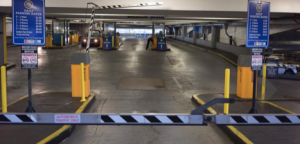
Tamesha Gibson Attacked and Robbed at CHI St. Vincent Infirmary Parking Deck. (Stock Photo)
Did a security failure contribute to this Little Rock parking garage assault and are justice and compensation available to the victim?
LOCAL NEWS
A woman was assaulted and robbed at a Little Rock, Arkansas hospital parking deck, Tuesday evening, April 2, 2019.
According to CampusSafetyMagazine.com, “[t]he victim, 25-year-old Tamesha Gibson, called CHI St. Vincent Infirmary’s security office on Tuesday evening when she saw a man and a woman peering into cars on the outpatient parking ramp.” After several minutes of waiting Ms. Gibson began walking to her car. According to KATV.com, “As she was walking to her vehicle, the man came up behind her and struck her in the head…[s]he was fighting back when the woman punched her in the head and bit her hand. The man held down Gibson while the woman took $10 from Gibson’s pocket.” The attackers then fled the scene by car. The media reports report that the victim suffered cuts and bruises in the attack.
The investigation is ongoing.
OUR LEGAL TAKE
Parking garage patrons have a right to feel safe and secure while on the premises. The Murray Law Firm questions the level of security provided on the property and whether this unconscionable attack may have been prevented.
- Have there been prior incidents of violence or assault on the property?
- How did the assailants gain entry to the property, and remain undetected?
- Why did security personal not investigate the suspicious activity call?
- How were the assailants able to leave the garage after security was notified of the suspicious behavior?
- What security measures, such as surveillance cameras and security patrols, were in place to deter crime and protect Ms. Gibson at the time of the assault?
Generally, property owners are required to protect all those legally on the premises from any foreseeable harm. Should the facts of this matter reveal that the property owner or management company failed to provide adequate security to protect those on its premises, Ms. Gibson may seek justice and elect to pursue legal claims for her injuries and suffering.
Based upon its prior successful experience in handling security negligence claims on behalf of victims and their families, The Murray Law Firm suggests that photographs and a thorough, unbiased inspection of the property will need to be performed immediately, before any evidence may be repaired, damaged or destroyed. Given the complexities of pursuing a negligent security case, it is imperative that Ms. Gibson retain an experienced attorney who can ensure the preservation of any and all evidence that may support such a claim.
OUR RESULTS
The Murray Law Firm has an extensive and successful record representing victims of violence and security negligence. We have obtained over $100 Million in verdicts and settlements for our Clients, including a $29.25 million dollar verdict for a victim of an unsafe property. We offer our legal assistance, if desired.
We represent our Clients on a contingency agreement, which generally means that no fees or payments are owed until and unless we recover. Anyone seeking further information or legal representation is encouraged to contact us via e-mail (click here) or by telephone at 888.842.1616. Consultations are free and confidential.
Choosing the Right Attorney (Click Here)
 The Legal Herald
The Legal Herald


